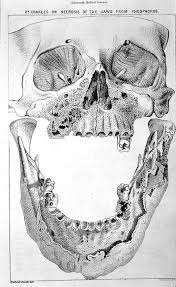This week we are looking at an old condition, called Phossy jaw, also known as phosphorus necrosis of the jaw, was a fatal occupational disease that affected workers in match factories. It was caused by exposure to white phosphorus fumes. The disease affected the poor the most.
I heard about this
in the book I just read called Factory Girl which was about a young girl
working in a match factory in London in 1888.
This condition, clinically known as osteonecrosis of the jaw, vanished
until it recently reappeared in the 21st century. More about that later.
Back in the 19th century these were the Symptoms:
- Pain, swelling, and debilitation
- Dental decay
- Periostitis
- Osteomyelitis
- Unbearable abscesses in the mouth
- Facial disfigurement
- Brain damage
The
condition was so bad that it was an epidemic from 1858 to 1906, with around 11% of those exposed to phosphorus developing
the disease. The average period from
first exposure to diagnosis was five years. It was fatal in about 20% of cases.
The prevention and
treatment at the time consisted of the following:
- Regulations were put in place in
Germany, Norway, and Sweden to reduce exposure
- In the UK, manufacturers were required
to inform the Medical Officer of Health of any jaw swelling or
necrosis
- Antibiotics, oral analgesics, and
mouthwashes are often effective treatments
Other names: phosphorus necrosis of the jaw, an epidemic of osteonecrosis, and a gangrenous condition of the lower jawbone.
Phossy jaw in the
21st century is now known as bisphosphonate-induced osteonecrosis of the
jaw, or "bis-phossy jaw". It's a condition that causes jawbone
necrosis, similar to the 19th century disease of the same name.
It's now caused by exposure
to Bisphosphonates which are a class of drugs used to treat osteoporosis
and some cancers. Bisphosphonates inhibit bone resorption. Intravenous
bisphosphonates are associated with a much higher risk of bis-phossy jaw than
oral bisphosphonates.
Symptoms exposed
bone in the mouth, pain, purulence, sequestration, and osteomyelitis.
When it comes to prevention,
patients taking bisphosphonates should inform their dental provider before receiving
any dental care.







Wow.... so many diseases we inflict on ourselves. Never heard this one, not sure I'm glad I did...
ReplyDeleteNot something I had heard of myself, it sound horrible
DeleteThis is a disease I've not heard of before, Jo-Anne. It's horrible! I'm so fortunate to be able to go to my dentist on a regular schedule when so many others today and in the past couldn't do so. Blessings!
ReplyDeleteNot only can we see a dentist but we get numbing and pain relief which they didn't have back then
DeleteI hadn't heard of this, either! Sounds just dreadful!
ReplyDeleteYes I thought so which is why I wrote about it
DeleteWow I never knew this. So much back then, they just didn’t know about and many afflicted. Just terrible
ReplyDeleteYeah they had it bad back then
DeleteI understand why phossy jaw was fatal in the 19th century, after workers were exposed to a chemical used in the match manufacturing process. But why is phossy jaw coming back now? When doctors order Bisphosphonates, do they not know the possible consequences?
ReplyDeleteYes I was shocked to read that it was still a thing in this day and aged
DeleteNever heard of this until now. Those poor people.
ReplyDeleteYes they would have suffered so much
DeleteIt has actually happened to a throat cancer patient I know. His jawbone is almost completely gone from the medications he has to take for the cancer. So very sad.
ReplyDeleteThat is so sad and not something I knew could happen
DeleteI've heard of this in relation to the osteoporosis drugs. It was a few years ago, so I'm not sure if they've improved the drugs to the point this isn't a factor. It sounds miserable.
ReplyDeleteIt would have been terrible and so painful
Delete